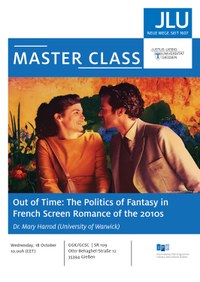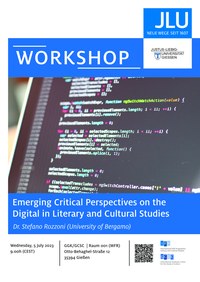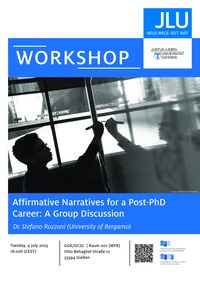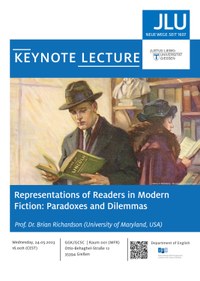Masterclasses & Workshops
The IPP organises masterclasses and workshops with renowned professors and researchers from around the world. They share their current research with our candidates and discuss contemporary developments in literary theory and history from different perspectives. Some masterclasses are organised as part of the defence of one of our candidates, creating synergies that benefit all members of the centre.
Dr Mary Harrod (University of Warwick)
Out of Time: The Politics of Fantasy in French Screen Romance of the 2010s
18.10.2023, 10.00 - 12.00 - SR 109 (GGK/GCSC Building)

In this lecture, I will put concepts of romantic fantasy and transnational (post)feminism into dialogue with one another through the case study of contemporary French filmed romantic comedy. More specifically, I will explore the way in which the genre’s recently amplified embrace of fantastic tropes – notably linked to time travel and atemporality more broadly – while in some ways mirroring global trends, responds to a situation whereby greater demands for gender equality have troubled Gallic cultures of intimacy.
Focalising a range of differently positioned case studies, the masterclass will draw on concepts of romance as both textual and social genre to consider the narrative and iconographic contortions required to keep the former alive as the latter comes under increasing fire, as well as fault lines within these and thus the shifting social context that they instantiate. Significantly, this optic encompasses concepts of transnational (market) identity, bearing in mind the intersectionality between generational (temporal) and cultural (geo-spatial) difference recently foregrounded by French responses to #MeToo, and simultaneously representing a classic topos of the fantastic mode. In this regard, the lecture will finally interrogate the recent trend from the point of view of affective theories of cosmopolitanism and felt internationalism, especially as these intersect with popular feminism as an increasingly global concept, to ask whether the trans-local marketisation of ‘progressive’ discourses of gendered intimacy depoliticises these.
Bionote: Mary Harrod is Associate Professor in French Studies at the University of Warwick. She has authored multiple books: From France with Love: Gender and Identity in French Romantic Comedy (I.B. Tauris, 2015), Heightened Genre and Women’s Filmmaking in Hollywood (Palgrave Macmillan, 2021), and co-edited the following collections: The Europeanness of European Cinema: Identity, Meaning, Globalization (I.B. Tauris, 2015, with Mariana Liz and Alissa Timoshkina); Women Do Genre in Film and Television (Routledge, 2017, with Katarzyna Paszkiewicz), Winner of British Association of Film, Television and Screen Studies Best Edited Collection Prize 2019; and Imagining ‘We’ in the Age of ‘I’: Romance and Social Bonding in Contemporary Culture (Routledge, 2021, with Diane Negra and Suzanne Leonard). She is also the co-chief General Editor of French Screen Studies, with Ginette Vincendeau.
Register on StudIP
Previous masterclasses & workshops
Dr. Stefano Rozzoni (University of Bergamo)
Emerging Critical Perspectives on the Digital in Literary and Cultural Studies
05.07.2023, 10.00 - 12.00 - Konferezraum 001 (GGK/GCSC Building)

Bionote: Stefano Rozzoni is a postdoctoral researcher at the University of Bergamo. He has previously worked as a postdoc Assistant and lecturer at Universität Graz, Austria. His current postdoctoral project is dedicated to exploring human-nonhuman relational ethics in contemporary anglophone literary and cultural texts (2010-present) through the lens of the Digital Environmental Humanities. His research interests encompass environmental narratives, posthumanism, and the pastoral genre within British Modernism and contemporary literature and culture. His work includes various media and covers topics such as Franciscanism, ecology, and economics; urban and rural spaces; human-nonhuman relationalities; and ecofascisms.
Dr. Stefano Rozzoni (University of Bergamo)
Affirmative Narratives for a Post-PhD Career: A Group Discussion
04.07.2023, 18.00 - 19.30 - SR 326 (GGK/GCSC Building)

Envisioning a scholarly career, both within and outside academia, after completing a PhD can feel daunting. Dominant cultural narratives often paint a discouraging picture, emphasizing the systemic difficulties of the job market and the uncertainties stemming from current economic instabilities. However, amidst these accounts, there are numerous success stories of young researchers who have pursued fulfilling postdoctoral positions. While these stories often go unnoticed, shedding light on them can provide alternative perspectives and offer guidance for planning and projecting one's future career paths.
Bionote: Stefano Rozzoni is a postdoctoral researcher at the University of Bergamo. He has previously worked as a postdoc Assistant and lecturer at Universität Graz, Austria. His current postdoctoral project is dedicated to exploring human-nonhuman relational ethics in contemporary anglophone literary and cultural texts (2010-present) through the lens of the Digital Environmental Humanities. His research interests encompass environmental narratives, posthumanism, and the pastoral genre within British Modernism and contemporary literature and culture. His work includes various media and covers topics such as Franciscanism, ecology, and economics; urban and rural spaces; human-nonhuman relationalities; and ecofascisms.
Prof. Brian Richardson (University of Maryland)
Representations of Readers in Modern Fiction: Paradoxes and Dilemmas
24.05.2023, 16.00 - 18.00 - Konferezraum 001 (GGK/GCSC Building)

Bionote: Brian Richardson is a Professor in the English department of the University of Maryland, where he teaches modern literature and narrative theory. He is the author or co-author of seven books, including Unnatural Voices: Extreme Narration in Modern and Contemporary Fiction (2006, Perkins Prize winner); Unnatural Narratives: Theory, History, and Practice (2015), A Poetics of Plot for the Twenty-first Century: Theorizing Unruly Narratives (2019), and Essays on Narrative and Fictionality: Reassessing Nine Central Concepts (2021), a collection of his recent articles on several basic narratological subjects. His latest book, The Reader of Modernist Fiction, is scheduled to be published in 2024. Richardson has edited or co-edited ten collections of essays on narrative theory, including the anthologies Narrative Beginnings: Theories and Practices (2008) and with Jan Alber, Unnatural Narratology: Extensions, Revisions, and Challenges. He guest-edited special issues of Style on Concepts of Narrative (34.2, 2000) and on The Implied Author (44.1, 2011), an issue of Conradiana on Conrad and the Reader (35.1, 2003), and a group of essays on Unnatural Narrative and Feminist Theory in Storyworlds (2016). An issue of Style devoted to an analysis of his work appeared in December 2017. He has published over 100 articles; these have explored reader-response theory, narrative sequence, endings, character, fictionality, realism, African American and postcolonial narratives, the poetics of drama, and the narratives of literary history. His work has been translated into French, German, Czech, Portuguese, Danish, Magyar, Italian, Spanish, Turkish, Arabic, and Chinese. In 2011 he served as President of the International Society for the Study of Narrative.
